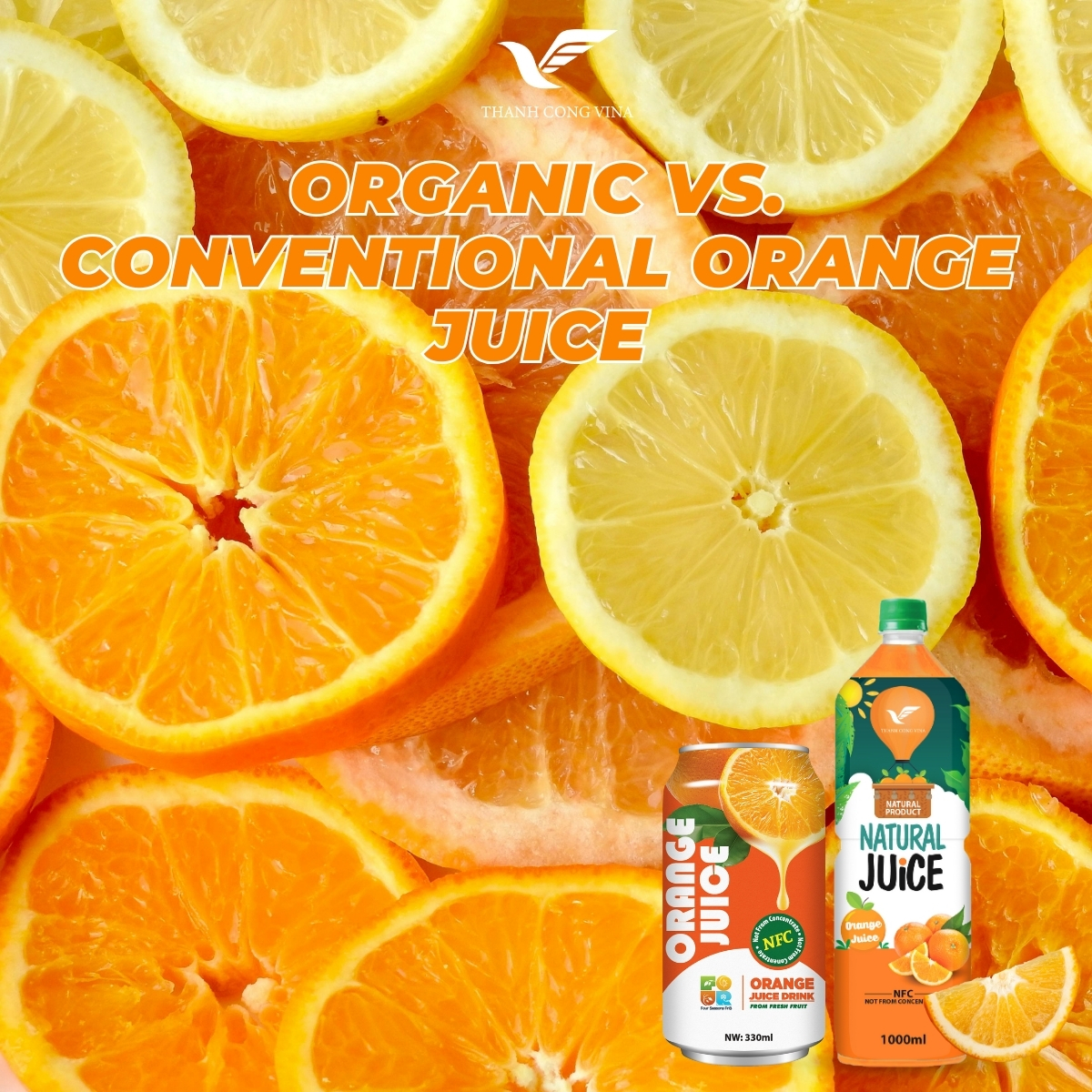Products Knowledge
Why You Should Switch to Organic Orange Juice Today
Orange juice has long been a morning staple for millions of people worldwide. It is refreshing, naturally sweet, and packed with vitamin C. However, not all orange juice is created equal. In recent years, the debate between conventional orange juice and organic orange juice has gained more attention. Consumers who care about their health, the environment, and the quality of their food are increasingly making the switch to organic orange juice. But what exactly sets it apart? And why should you consider changing your daily glass of juice to an organic alternative?
At Thanh Cong Vina, This article explores the unique benefits of organic orange juice, the differences between organic and conventional products, and why making the switch today could improve your health and lifestyle.
What Is Organic Orange Juice?

Organic orange juice is made from oranges grown without synthetic pesticides, fertilizers, genetically modified organisms (GMOs), or artificial additives. The farming practices used to grow these oranges follow strict organic certification standards that promote soil health, biodiversity, and sustainability.
Unlike conventional orange juice, which may contain preservatives, flavor packs, or concentrates to enhance taste and shelf life, organic orange juice is typically more natural and closer to the fruit’s original flavor. For health-conscious consumers, this makes it a cleaner, safer, and more nutritious option.
The Nutritional Value of Organic Orange Juice
Both conventional and organic orange juice are rich in vitamins and minerals, but organic juice often retains higher nutritional integrity due to careful farming practices and fewer chemical residues. A typical glass of organic orange juice provides:
-
Vitamin C: Boosts the immune system and supports collagen production.
-
Potassium: Essential for heart health and fluid balance.
-
Folate: Important for red blood cell formation and cell repair.
-
Antioxidants: Help reduce oxidative stress and protect against chronic diseases.
Studies suggest that organic fruits, including oranges, may contain higher concentrations of antioxidants and phytochemicals compared to their conventionally grown counterparts. This means that organic orange juice not only tastes better but also offers more nutritional benefits per serving.
Organic vs. Conventional Orange Juice

1. Farming Methods
-
Organic: No synthetic pesticides, chemical fertilizers, or GMOs are used. Farmers rely on natural compost, crop rotation, and biological pest control.
-
Conventional: Uses chemical fertilizers and pesticides, which can leave residues on the fruit.
2. Flavor and Quality
-
Organic: Fresher, more natural taste with no artificial flavoring agents.
-
Conventional: Often processed with flavor packs or concentrates to standardize taste.
3. Environmental Impact
-
Organic: Promotes soil health, reduces pollution, and preserves biodiversity.
-
Conventional: Heavy pesticide and chemical use can degrade soil and water quality.
4. Health Considerations
-
Organic: Lower exposure to harmful pesticide residues.
-
Conventional: Risk of long-term exposure to chemicals through daily consumption.
Health Benefits of Organic Orange Juice

Strengthens Immunity
Organic orange juice is a powerhouse of vitamin C and antioxidants. A single glass provides more than 100% of the recommended daily intake of vitamin C, helping the body fight infections and repair tissues.
Supports Heart Health
Rich in potassium and flavonoids, organic orange juice helps regulate blood pressure and improve circulation. These nutrients reduce the risk of cardiovascular diseases.
Aids Digestion
The natural compounds and enzymes in organic orange juice help support digestive health. Unlike processed juices that may contain added sugars or preservatives, organic juice is easier on the stomach.
Enhances Skin Health
Vitamin C and antioxidants in organic orange juice contribute to healthy, glowing skin. They protect against free radical damage and aid in collagen synthesis, keeping skin firm and youthful.
Reduces Toxin Exposure
Choosing organic minimizes your intake of pesticide residues and synthetic chemicals, reducing the toxin load on your liver and kidneys.
Why Switch to Organic Orange Juice Today

Better for Your Health
Organic juice means fewer harmful chemicals in your body. If you care about long-term wellness, switching today will give your immune system and organs a cleaner environment to function at their best.
Better for the Planet
Supporting organic farming reduces chemical use and promotes environmentally friendly practices that preserve ecosystems for future generations.
Better Taste
Many consumers report that organic orange juice tastes fresher, richer, and closer to the natural flavor of oranges than conventional options.
Better for Families
Organic options are particularly beneficial for children, who are more sensitive to pesticide exposure. Choosing organic orange juice ensures your family enjoys a safer, more natural beverage.
Final Thoughts
Orange juice has always been a symbol of freshness and vitality, but today’s consumers are looking for more than just taste. They want health, purity, and sustainability in every glass. Organic orange juice delivers on all these fronts. Switching to organic orange juice today means making a conscious choice for your health, your family, and the environment. With its superior nutritional profile, cleaner production methods, and better flavor, organic orange juice is more than just a drink—it is a lifestyle upgrade.
At TCVina, So the next time you pour yourself a glass of juice, make it organic. Your body and the planet will thank you.

